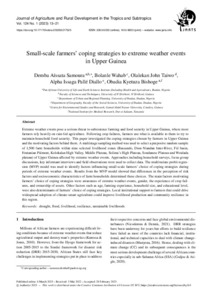| dcterms.abstract | Extreme weather events pose a serious threat to subsistence farming and food security in Upper Guinea, where most farmers rely heavily on rain-fed agriculture. Following crop failures, farmers use what is available to them to try to maintain household food security. This paper investigated the coping strategies chosen by farmers in Upper Guinea and the motivating factors behind them. A multistage sampling method was used to select a purposive random sample of 1,500 farm households within nine selected livelihood zones (Bassando, Dion-Niandan Inter-River, Fié basin, Foutanian Piémont, Kolokalan High Valley, Middle Plateau, Solima's High Plateau, Soudanese Plateau and Woulada plateau) of Upper Guinea affected by extreme weather events. Approaches including household surveys, focus group discussions, key informant interviews and field observations were used to collect data. The multivariate probit regression (MVP) model was used to identify factors influencing small-scale farmers’ choice of coping strategies during periods of extreme weather events. Results from the MVP model showed that differences in the perception of risk factors and socioeconomic characteristics of farm households determined these choices. The main factors motivating farmers’ choice of coping strategies were awareness of extreme weather events, gender, the experience of crop failures, and ownership of assets. Other factors such as age, farming experience, household size, and educational level, were also determinants of farmers’ choice of coping strategies. Local institutional support to farmers that could drive widespread adoption of climate-smart agriculture could improve livelihood production and community resilience in this region. | eng |


